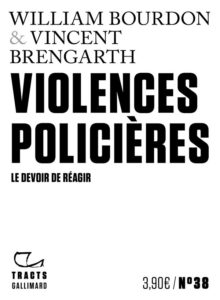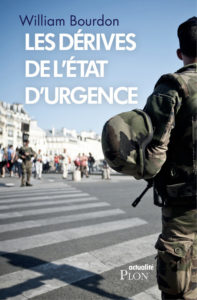Latest publications

Violences policières. Le devoir de réagir
Police violence: the duty to react
William Bourdon, Vincent Brengarth
April 28th 2022 – Editions : Gallimard – Collection Tracts/Gallimard
“It is urgent to react to reconcile the police and population by taking in consideration all the woes that police violence reveal.” William Bourdon and Vincent Brengarth.
Police violence affects the trust of people in the police and, through them, in the institutions. Too often, our political leaders deny its existence et refuse any public debate on the woes that it originates from. We are witnesses of the obstacles that prevent observing and sentencing it. We propose to share our experience of men of law, with the concern of nuance on a burning subject, while formulating propositions. Finding the needed cures to end police violence is the condition to repair credit of the police and, beyond, the judicial institution. A democratic and citizen emergency.
Previous publications
- Contribution to a collective book on the International Criminal Court in The Hague («La Haye», L’HARMATTAN, 1994); and to a book on international justice in Rwanda (“La Justice Internationale au Rwanda” KHARTHALA – 1995)
- Auteur in cooperation with Ms. Emmanuelle DUVERGER, of « La Cour Pénale Internationale – Le Statut de Rome », May 2000 (Editions du Seuil – Collection POINT)
- Contribution to “L’état de la Justice en France”, collective, Editions LA DECOUVERTE under the supervision of Ms. Mireille DELMAS MARTY, Octobre 2001
- Contribution to “Droit international public ” under the direction of Mr. Hervé ASCENCIO, Emmanuel DECAUX et Alain PELLET, Edition A. PEDONE – 2000
- Auteur of “Face aux crimes du marché. Quelles armes juridiques pour les citoyens?”, 2010 (Editions LA DECOUVERTE)
- Contribution to “Réguler les entreprises transnationales – 46 propositions”, December 2010
- Contribution to : “Les Démocraties à l’epreuve du terrorisme”, collective, Editions LA DECOUVERTE – 2010.
- Contribution to “Contre l’arbitraire du pouvoir”, Editions LA DECOUVERTE – February 2012 : individual article entitled “L’exception antiterroriste”
- Participation in numerous conferences on international crime, particularly relating to financial crime and globalization (including in PORTO ALEGRE, DAKAR, JOHANNESBURG, DOHA, WASHINGTON, and most recently in BRASILIA in November 2012 for the 15th International Anti-Corruption Conference (IACC), and in LONDON in September 2013 for the third “Arab Forum Special Session” (on the role of civil society in asset recovery)
- Author of numerous articles in both international, general and specialized press outlets on the fight against impunity, terrorism, corruption, money laundering, market speculation, the International Criminal Court, environmental law, the status of whistleblowers, environmental crimes, etc.


